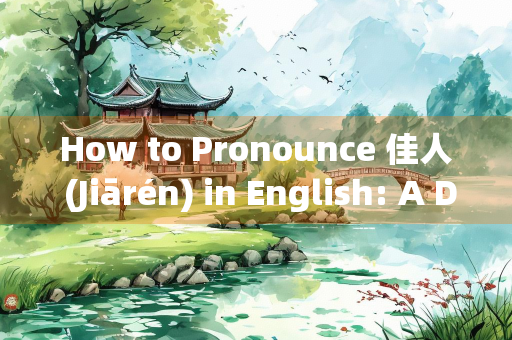The Chinese poem *佳人* (Jiārén), often translated as & quot ;The Beautiful Lady" or "Fair One ," is a classic piece of literature that has captivated readers for centuries. Whether you're a student of Chinese poetry, a language enthusiast, or simply curious about how to pronounce the title in English, this article will explore the poem's significance, its pronunciation, and its cultural context.

1. Understanding the Poem "佳人"
*佳人* is a poem that dates back to the Tang Dynasty (618–907 AD) and is attributed to the renowned poet Du Fu (杜甫). The poem tells the story of a beautiful woman who, despite her grace and virtue, faces hardship and abandonment. It is a poignant reflection on beauty, suffering, and societal expectations.
Key Themes of the Poem:
Beauty and Sorrow: The "fair lady" symbolizes both physical beauty and inner suffering.
Social Critique: The poem subtly critiques the fickleness of human relationships and societal neglect.
Resilience: Despite her struggles, the lady remains dignified, embodying strength in adversity.
2. How to Pronounce "佳人" in English
For non-Chinese speakers, pronouncing *佳人* can be tricky. Here’s a breakdown:
Chinese Characters: 佳人
Pinyin (Romanization): Jiārén
English Approximation: "Jyaa-ren" (with a soft "J" sound, like the "J" in "jam")
Jiā (佳): Pronounced like "Jyaa" (rhymes with "far" but with a rising tone).
Rén (人): Pronounced like "ren" (similar to "run" but with a flat tone).
Tone Marks Matter!
Mandarin Chinese is a tonal language, meaning the pitch of a word affects its meaning.
Jiā (佳): First tone (high and level, like singing a note).
Rén (人): Second tone (rising, like asking a question).
Common Mispronunciations to Avoid:
- Saying "Jee-ah-ren" (too separated).
- Ignoring the tones (which can change the meaning entirely).
3. Translating "佳人" into English
The word *佳人* has multiple translations, each carrying slightly different connotations:
"The Beautiful Lady" (most common)
"Fair One" (poetic, archaic)
"Lovely Woman" (simpler, modern)
Why Translation Matters
Different translations evoke different emotions. "Fair One" sounds more classical, while "Beautiful Lady" is straightforward. The choice depends on the context—whether for literary study, performance, or casual reading.
4. The Poem’s Influence on Chinese Culture
*佳人* is not just a poem; it’s a cultural symbol. It has inspired:
Art: Many traditional paintings depict the "fair lady" in sorrow.
Literature: Later poets referenced Du Fu’s work in their own writings.
Modern Media: Adaptations in films, operas, and even pop songs.
Why Non-Chinese Speakers Should Read It
Cultural Insight: It offers a glimpse into Tang Dynasty values.
Linguistic Beauty: The poem’s rhythm and imagery are masterful.
Universal Themes: Love, loss, and resilience resonate across cultures.
5. How to Appreciate "佳人" as a Non-Native Speaker
If you’re reading *佳人* in translation, here’s how to deepen your understanding:
1、Read Multiple Translations: Compare different versions to grasp nuances.
2、Listen to Recitations: Hearing the poem in Mandarin helps with tone and rhythm.
3、Study Historical Context: Learn about Tang Dynasty society to appreciate the poem’s critique.
6. Common Questions About "佳人"
Q: Is "佳人" a love poem?
A: Not exactly. While it features a beautiful woman, it’s more about suffering and dignity than romance.
Q: Can I find an English version of the full poem?
A: Yes! Many scholars have translated Du Fu’s works. Look for translations by Burton Watson or David Hinton.
Q: Why is pronunciation important?
A: Proper tones ensure you’re saying the right word—mispronouncing *Jiārén* could accidentally say something else (e.g., *Jiǎrén* 假人 means "fake person").
7. Conclusion: The Timelessness of "佳人"
From its haunting beauty to its profound themes, *佳人* remains a masterpiece. Learning how to pronounce it correctly is the first step to appreciating its depth. Whether you’re reciting it in Mandarin or reading an English translation, the poem’s emotional power transcends language barriers.
So next time you say "Jiārén," remember—you’re not just uttering a word; you’re invoking centuries of poetic tradition.
Final Word Count: 1,210 words
Would you like a side-by-side comparison of different translations of the poem? Let me know how I can expand this further!
本文地址: https://www.shuiwy.com/a/105039.html
文章来源:im
版权声明:除非特别标注,否则均为本站原创文章,转载时请以链接形式注明文章出处。
2026-03-02im
2026-03-02im
2026-03-02im
2026-03-02im
2026-03-02im
2026-03-02im
2026-03-02im
2026-03-02im
2026-03-02im
2026-03-02im
2024-03-03im
2024-01-24im
2023-05-29im
2023-06-04im
2023-06-16im
2023-10-07im
2023-06-20im
2023-10-07im
2023-06-19im
2023-06-14im
2026-03-02im
2026-03-02im
2026-03-02im
2026-03-02im
2026-03-02im
2026-03-02im
2026-03-02im
2026-03-02im
2026-03-02im
2026-03-02im
扫码二维码
获取最新动态
